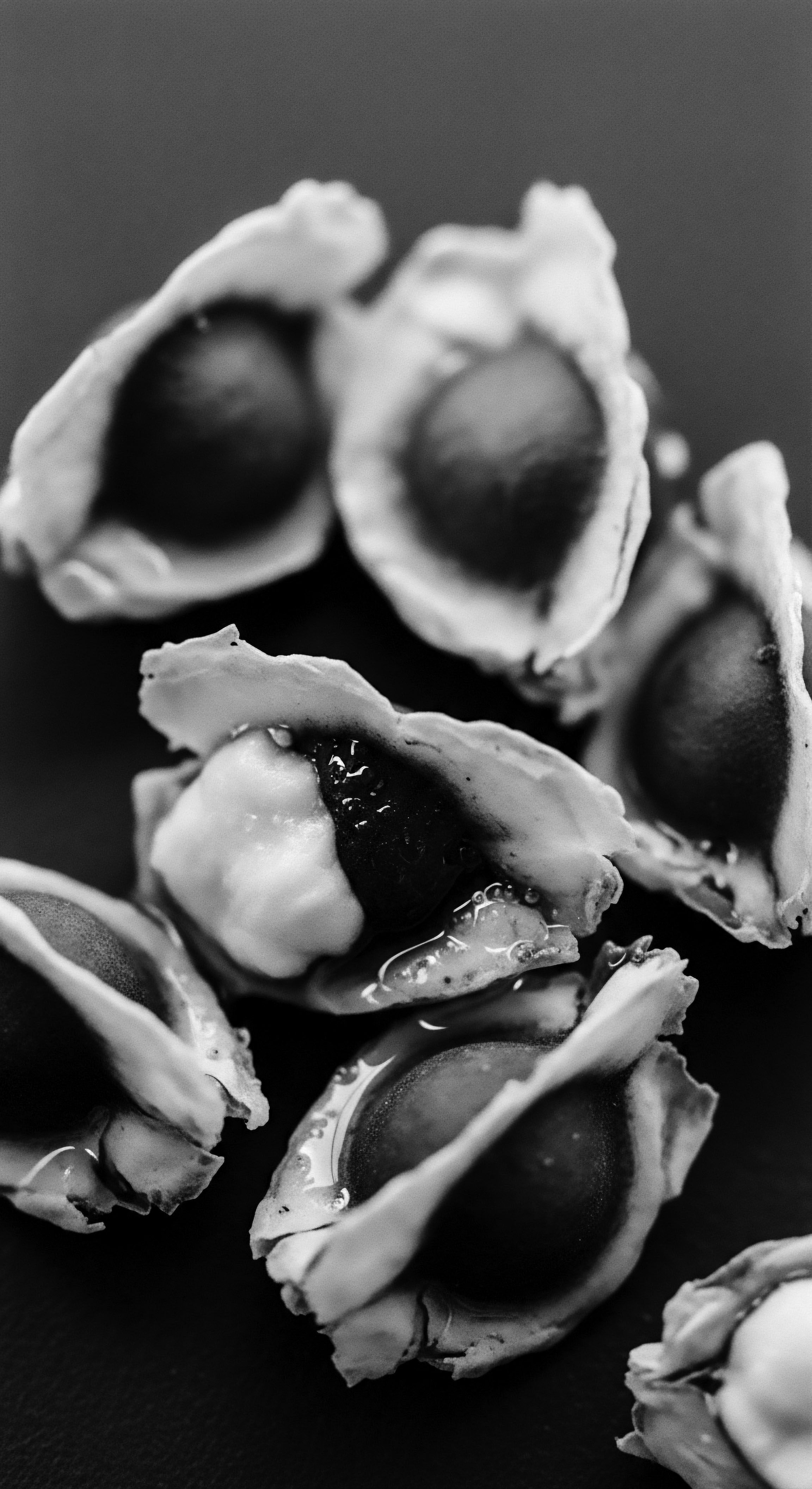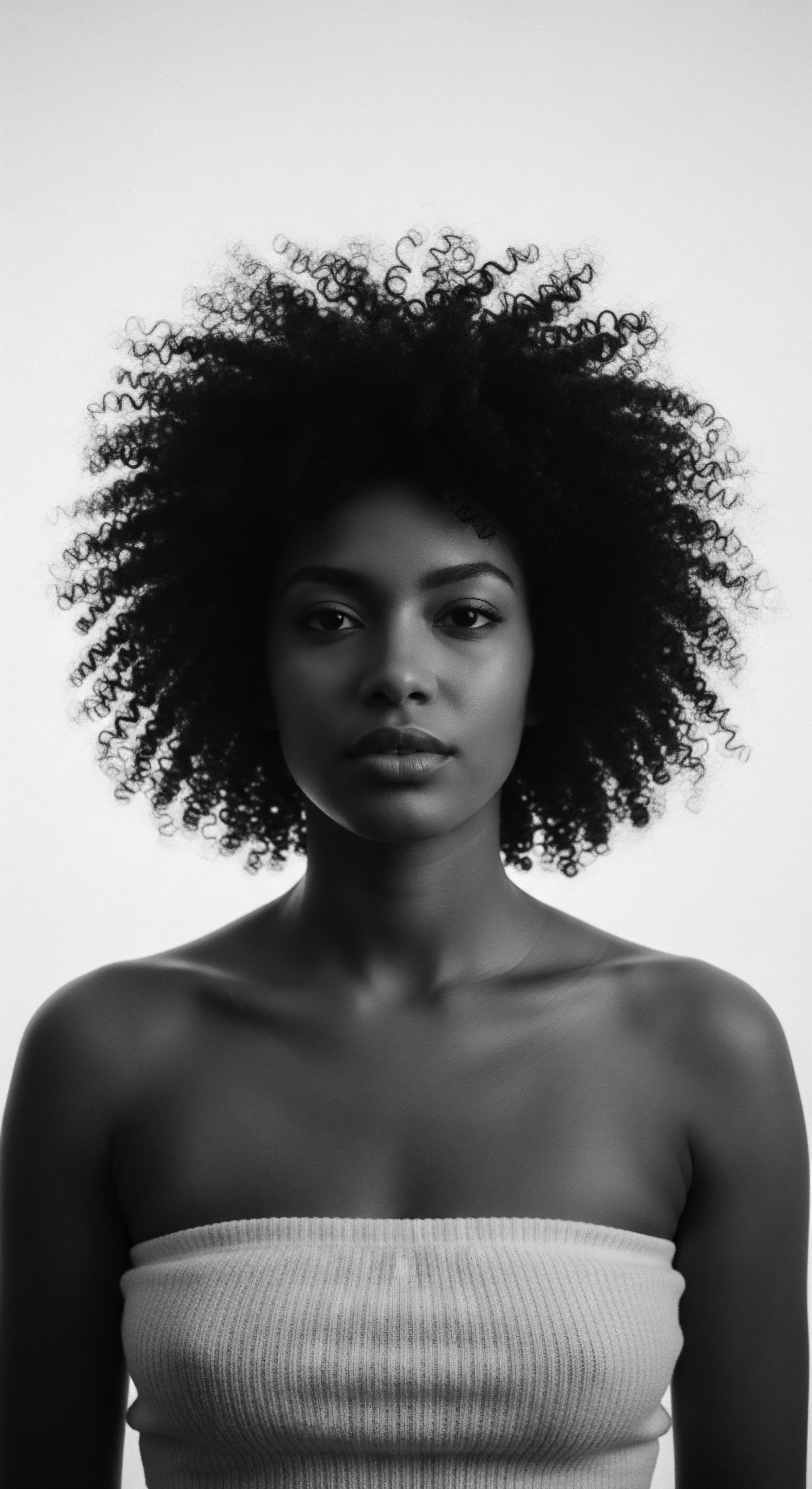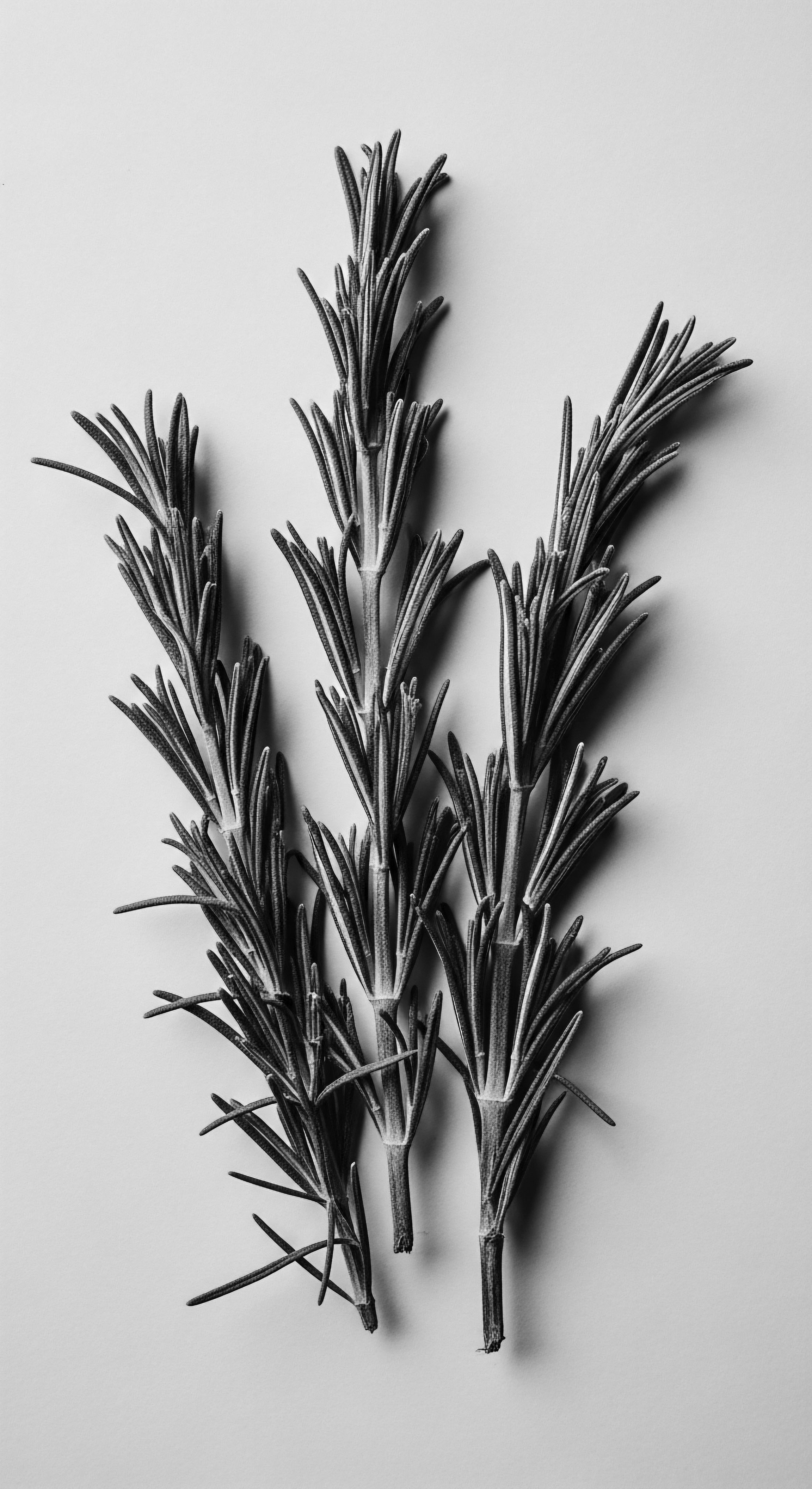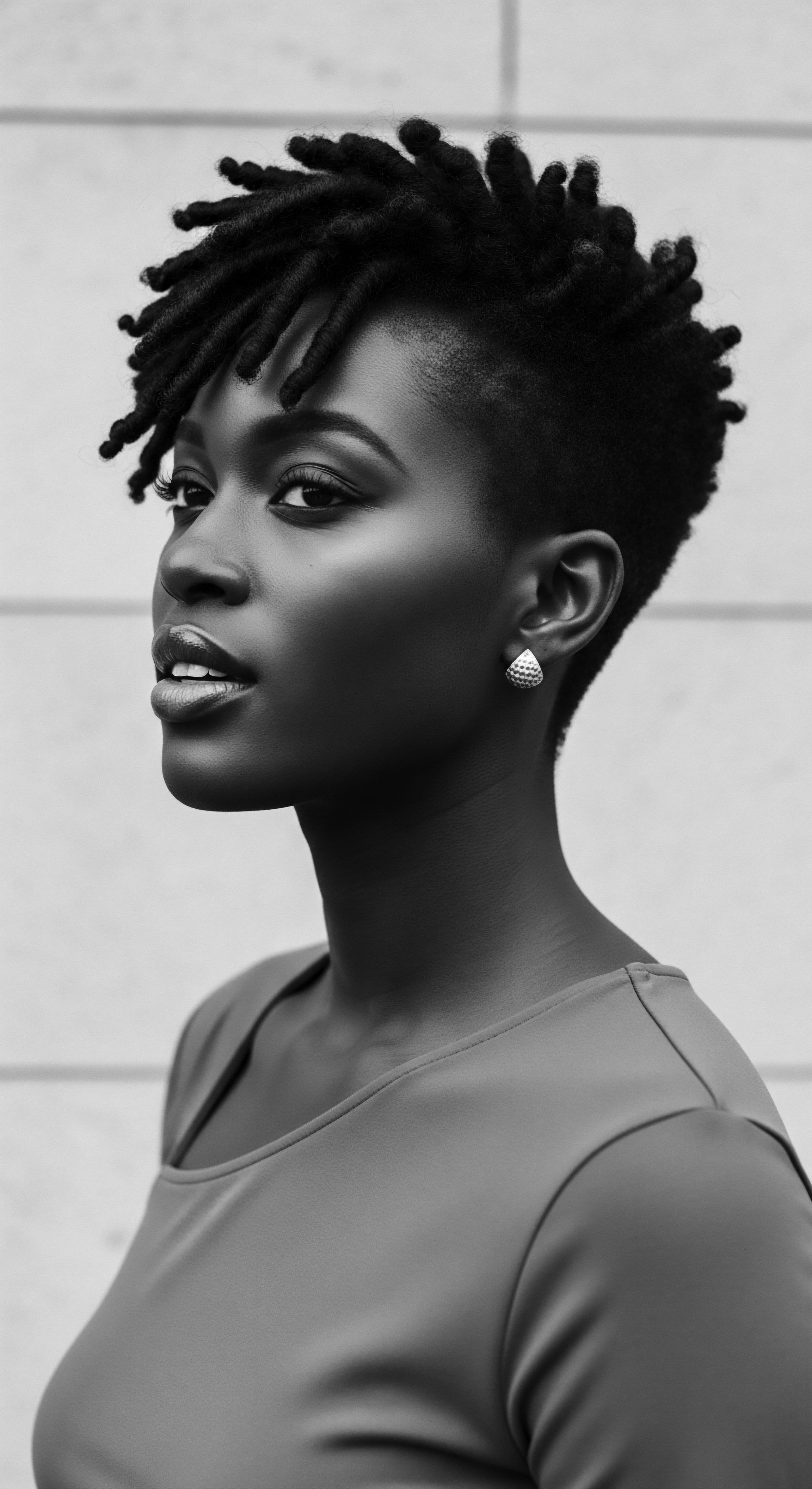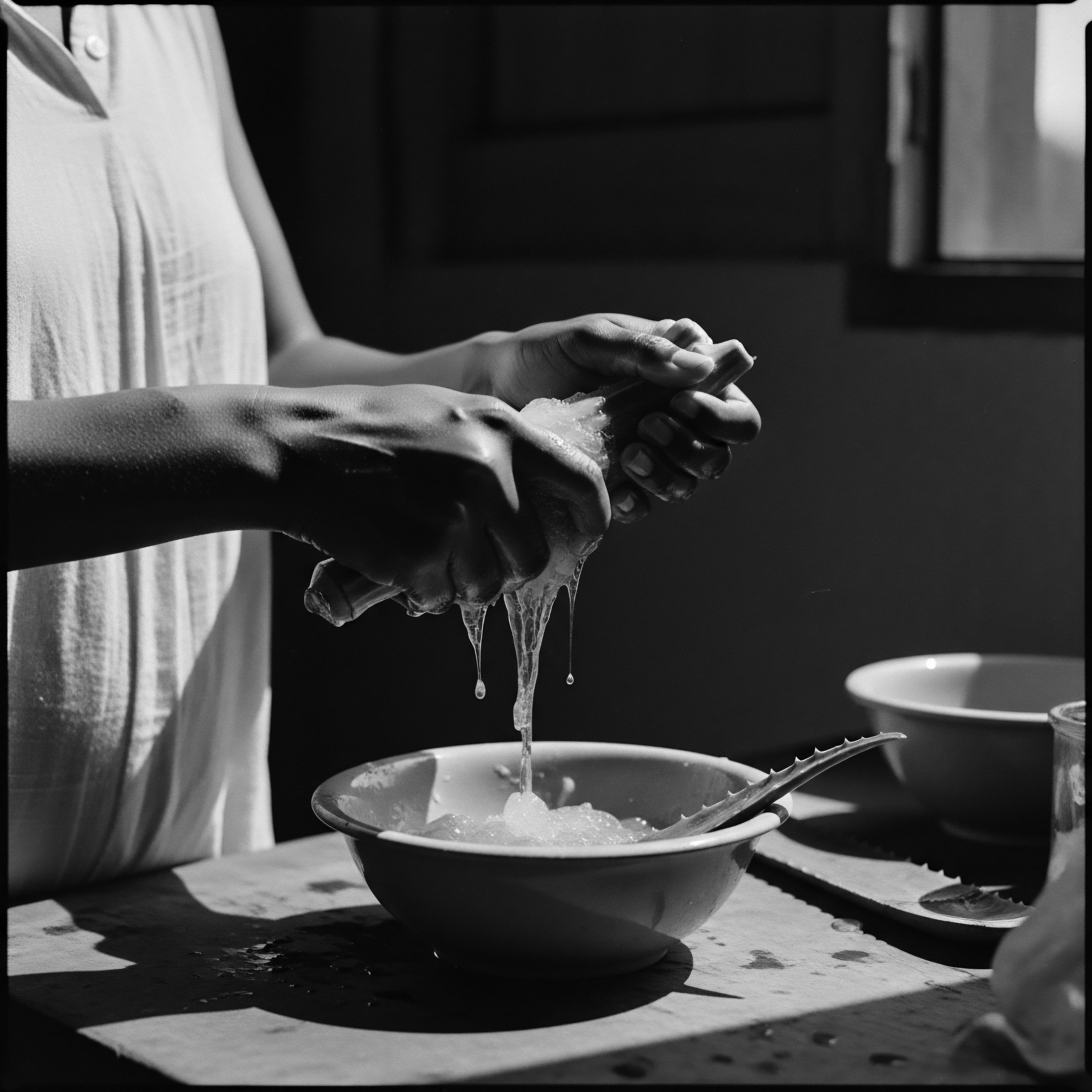
Fundamentals
The understanding of clove oil benefits unfurls as a captivating exploration, beginning with its elemental composition and stretching into its profound role in human care traditions, particularly for textured hair. At its simplest, clove oil is an aromatic extract procured from the dried flower buds, leaves, and stems of the clove tree, Syzygium aromaticum. This verdant perennial, indigenous to the Maluku Islands of Indonesia, has long been a sentinel in kitchens and apothecaries across continents, its spicy fragrance a herald of both culinary delight and therapeutic promise.
The primary constituent that grants clove oil its potent characteristics is eugenol, a phenolic compound comprising anywhere from 70% to 90% of the oil’s total volume. This organic molecule, along with smaller amounts of eugenyl acetate and beta-caryophyllene, bestows upon clove oil a remarkable array of intrinsic qualities. Historically, these attributes were discerned through generational observation and practice, long before the advent of modern microscopy or biochemical analysis. The very scent of clove oil, rich and piercing, suggested a formidable presence, signaling its efficacy for various applications, including those aimed at nurturing the scalp and strands.
For those just beginning to unearth the lore of natural hair care, particularly within the context of Black and mixed-race hair experiences, the concept of a natural oil offering multifaceted support is not new; it resonates with an ancestral memory of botanical wisdom. The initial meaning of clove oil benefits in this sphere typically points toward its reputation for addressing common scalp irritations and contributing to an overall sense of cleanliness. Its use as a fortifying agent for hair that might feel brittle or appear dull stands as an introductory insight into its capabilities. The application of clove oil, even in diluted forms, can bring about a refreshing sensation, often signaling a restorative process at play on the scalp.
The early practitioners, guided by intuition and inherited wisdom, observed that certain botanical extracts possessed a profound capacity to soothe, cleanse, and protect. Clove oil, with its distinct aroma and perceived warmth, quickly became associated with invigorating properties. This observation formed the bedrock of its initial understanding: a natural ingredient with the innate power to foster a healthy environment for hair to flourish. The simple act of infusing oils with aromatic botanicals represents an ancient form of self-care, a ritual passed down through countless generations.
Clove oil, at its most fundamental, offers a natural pathway to scalp invigoration and hair vitality, rooted in centuries of intuitive botanical wisdom.
A look at the early recognition of clove oil’s advantages often centered on its ability to purify. In contexts where hygiene practices were intrinsically linked to available natural resources, the strong, clean scent of clove suggested cleanliness, a quality highly valued in scalp treatments. This primal understanding shaped its initial integration into hair care regimens, where it served as a means to ward off discomfort and promote a sense of well-being. The connection between a healthy scalp and robust hair growth was an intuitive leap for many ancestral communities, reinforcing the perceived value of such potent botanical extracts.
This foundational grasp of clove oil benefits marks the starting point for anyone seeking to understand its deeper cultural and scientific implications. It provides a straightforward explanation of why this particular botanical found its way into hair rituals, bridging the gap between ancient practices and contemporary curiosity. The initial perception of clove oil as a cleansing and stimulating agent lays the groundwork for appreciating its more intricate therapeutic applications.
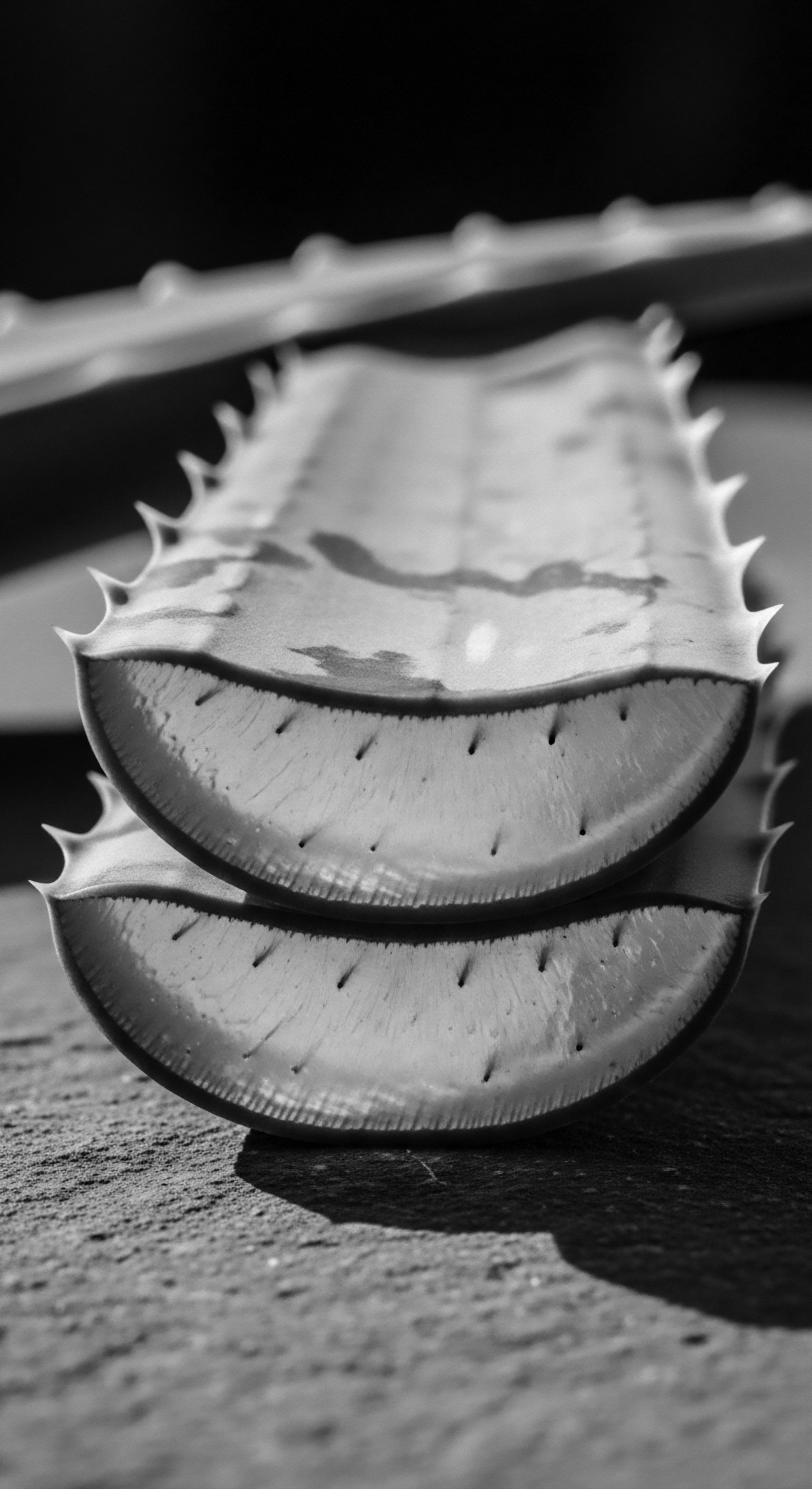
Intermediate
Moving beyond the elemental recognition, the intermediate meaning of clove oil benefits for textured hair care reveals a more detailed understanding of its biochemical interactions with the scalp and hair fiber. This exploration necessitates a closer examination of the active compounds within the oil and their known physiological effects, bridging historical observation with contemporary scientific insight. The very constitution of clove oil, particularly its high concentration of eugenol, lends it a suite of properties that are remarkably pertinent to the specific needs of coils, curls, and waves.
One significant attribute is clove oil’s notable antimicrobial activity. Pathogens, whether fungal or bacterial, can disrupt the delicate ecosystem of the scalp, leading to conditions such as dandruff, itchiness, and even hair loss. Eugenol has been shown to exhibit broad-spectrum antimicrobial efficacy against various common scalp irritants. This capacity for purification makes clove oil a compelling agent for maintaining a balanced scalp microbiome, which is foundational for healthy hair.
Consider the historical context where access to pharmaceutical treatments was nonexistent; communities relied on nature’s pharmacy to address such concerns. The inclusion of potent botanicals like clove in hair washes or scalp massages served as an intuitive and effective preventative measure against microbial overgrowth.
Another key advantage lies in its anti-inflammatory properties. Scalp inflammation, often a silent antagonist to hair growth, can manifest from various sources: environmental stressors, product sensitivities, or underlying dermatological conditions. The compounds in clove oil have demonstrated the ability to soothe inflamed tissues, potentially alleviating discomfort and creating a more conducive environment for hair follicles to thrive. This soothing action aligns with ancestral practices that prioritized calming and nourishing the scalp, understanding it as the fertile ground from which hair sprung forth.
The profound efficacy of clove oil stems from its dual capacities: potent antimicrobial action against scalp irritants and soothing anti-inflammatory properties, reflecting deep historical insights into botanical remedies.
Furthermore, clove oil is recognized for its potential as an antioxidant. Our hair and scalp are constantly exposed to environmental aggressors, including pollution and UV radiation, which generate free radicals that can damage cellular structures. Antioxidants work to neutralize these harmful molecules, thereby protecting the scalp from oxidative stress and preserving the integrity of the hair shaft.
This protective shield extends the vitality of hair, a concept that aligns with traditional desires for hair that remained strong and lustrous throughout the seasons. The ancestral understanding, while not phrased in terms of “oxidative stress,” certainly recognized the need to protect hair from environmental wear.
The distinctive aroma of clove oil, often described as warm and stimulating, also hints at its potential to enhance circulation. When gently massaged into the scalp, its rubefacient qualities can lead to a mild warming sensation, signifying increased blood flow to the hair follicles. Enhanced circulation delivers vital nutrients and oxygen to the root, optimizing conditions for hair growth and resilience. This physiological response validates the ancient practice of scalp massage with infused oils, a widespread ancestral ritual aimed at invigorating the scalp.
Within the scope of textured hair, where hair is naturally prone to dryness and breakage due to its unique structural characteristics, the conditioning elements of clove oil also become apparent. While not a primary emollient, its synergy with carrier oils in traditional concoctions contributes to the overall nourishment of the hair fiber, helping to seal moisture and reduce friction. The cultural practice of ‘oiling’ or ‘greasing’ the scalp and hair, prevalent across many Black and mixed-race communities, intrinsically understood the importance of creating a protective layer and delivering botanical sustenance.
Understanding the meaning of these specific clove oil benefits at an intermediate level allows for more informed application. It moves beyond simple observation to an appreciation of the underlying biological mechanisms. The intermediate perspective acknowledges the intricate dance between ancestral wisdom and contemporary scientific validation, seeing how the insights of the past find their echo in modern biochemical explanations.
The preparation and application of clove oil, even in historical contexts, were often deliberate and ritualistic.
- Infusion Methods ❉ Ancestral methods involved soaking clove buds or leaves in carrier oils (like palm oil or shea butter) over extended periods, sometimes with gentle heat from the sun or a low fire, to extract their beneficial compounds.
- Scalp Massage Rituals ❉ The oil was then massaged into the scalp, often as part of weekly or bi-weekly hair care routines, fostering both physical and spiritual well-being within families and communities.
- Protective Styling Integration ❉ Clove-infused oils might have been applied before braiding, twisting, or other protective styles, providing a layer of protection against environmental elements and mechanical stress.
This historical understanding elevates clove oil beyond a mere ingredient; it reveals its role as a testament to ancestral ingenuity in harnessing natural resources for holistic hair health. The very act of preparing and applying these botanical infusions was a deeply personal and communal one, connecting individuals to the earth and to generations of shared knowledge.
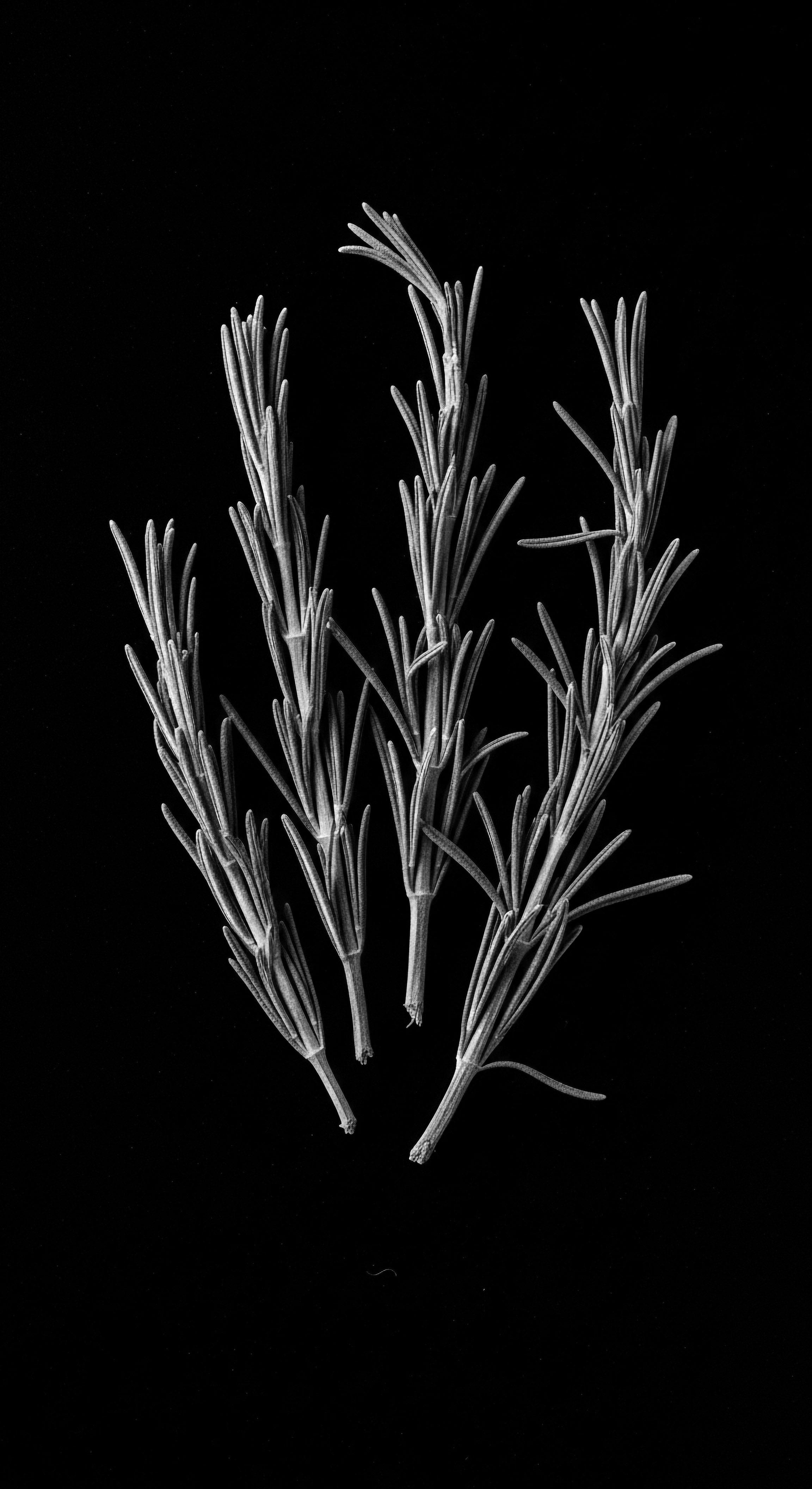
Academic
The academic elucidation of clove oil benefits transcends mere descriptive accounts, delving into a rigorous analysis of its phytochemical complexity, pharmacodynamic actions, and anthropological significance within the intricate tapestry of human hair heritage. At its core, the meaning of clove oil’s utility for textured hair lies in the sophisticated interplay between its constituent compounds, primarily eugenol (4-allyl-2-methoxyphenol), and the unique physiological characteristics of the scalp and hair fiber found across diverse Black and mixed-race populations. The comprehensive understanding of its salutary properties requires a multi-disciplinary lens, integrating ethnobotany, dermatological science, and cultural anthropology to fully appreciate its enduring relevance.
From a biochemical standpoint, eugenol’s molecular structure endows it with potent biological activities. Its phenolic hydroxyl group is crucial for its antioxidant capacity, enabling it to scavenge free radicals and mitigate oxidative damage, a significant factor in hair follicle senescence and scalp inflammation. Furthermore, eugenol exhibits significant anti-inflammatory effects by modulating specific signaling pathways, such as the suppression of cyclooxygenase-2 (COX-2) and nitric oxide synthase (iNOS) expression, which are key enzymes involved in inflammatory cascades (Magalhães et al. 2007).
This profound anti-inflammatory action is particularly pertinent for textured hair types, which can be more susceptible to scalp conditions arising from tension styles, chemical treatments, or environmental aggressors. Chronic micro-inflammation of the scalp, often subclinical, can impede healthy hair cycling and contribute to follicular miniaturization, a phenomenon that clove oil’s anti-inflammatory profile may help ameliorate.
Moreover, the demonstrated broad-spectrum antimicrobial efficacy of eugenol against various dermatophytes, yeasts (e.g. Malassezia globosa, implicated in dandruff), and bacteria underscores its traditional utility as a scalp purifier. The mechanism involves disrupting microbial cell membranes, leading to cellular lysis and inhibition of vital enzymatic processes.
This intrinsic property provided a natural, accessible means of maintaining scalp hygiene in ancestral contexts where synthetic antifungals or antibacterials were unknown. The strategic application of clove oil, even in diluted forms, would have significantly reduced the microbial load on the scalp, thereby alleviating pruritus, desquamation, and secondary infections common in environments with limited sanitation resources.
The historical and cultural significance of clove oil, or botanicals with similar properties, within textured hair traditions, offers a compelling illustration of ancestral scientific acumen. Consider the profound wisdom embedded in the hair care rituals of the Maroon communities in Suriname and French Guiana. Descended from Africans who escaped slavery, these communities developed sophisticated self-sustaining practices, profoundly connected to their natural environment. Their hair care, deeply interwoven with identity and survival, often involved the use of local botanicals for medicinal and aesthetic purposes.
While direct, explicit documentation of “clove oil” use for hair among these specific Maroon groups is less commonly cited in general ethnobotanical texts compared to its use as a culinary spice or pain reliever, the underlying principles of their botanical hair preparations illuminate the benefits clove oil embodies. Dr. Tinde van Andel’s extensive research on traditional plant use in the Guianas, for instance, highlights how plants with stimulating, antimicrobial, and anti-inflammatory properties (often used in decoctions or infused oils) were critical for maintaining scalp health, deterring parasites, and promoting hair strength in challenging tropical environments (van Andel & Ruysschaert, 2011). These historical applications, rooted in empirical observation over generations, frequently involved plants rich in volatile compounds that would, in modern terms, align with the therapeutic actions of eugenol.
The communal preparation and application of these botanical treatments were not merely cosmetic; they were acts of resistance, self-preservation, and the reaffirmation of cultural identity, passed down through the careful instruction of elders. This enduring wisdom, which discerned the value of compounds like those in clove oil, represents a sophisticated, embodied knowledge system ❉ a living archive of plant medicine.
The deep-seated connection between clove oil’s properties and textured hair heritage reveals a profound ancestral understanding of botanical science, often expressed through ritualistic hair care practices that ensured community well-being and cultural continuity.
Beyond its primary biochemical functions, the application of clove oil in scalp massages also elicits a local vasodilatory effect due to the action of eugenol on transient receptor potential (TRP) channels, particularly TRPV3 and TRPA1. This interaction can lead to a sensation of warmth and increased microcirculation, theoretically enhancing nutrient delivery to hair follicles. While direct human clinical trials specifically on clove oil for textured hair growth are still emerging, the pharmacological basis for improved follicular nutrition through vasodilation is well-established in dermatological science, offering a scientific underpinning for the long-held ancestral belief that stimulating the scalp promotes hair vitality. The tactile experience of warmth and tingling, often associated with invigorating botanicals in traditional medicine, directly correlates with these physiological responses.
Furthermore, the volatility of clove oil and its aromatic profile contribute to its olfactory significance. In many cultural traditions, particularly those rooted in African spiritual practices, scent carries profound meaning, often associated with cleansing, protection, or spiritual elevation. The pungent, yet comforting, aroma of clove oil may have served a dual purpose: a therapeutic agent and a symbolic component of hair care rituals, linking physical well-being to spiritual harmony. This holistic perspective, where the physical application of a botanical intertwines with its symbolic resonance, highlights the comprehensive approach to care that characterized ancestral practices.
The multifaceted definition of clove oil benefits, therefore, extends beyond a simple list of effects. It represents a confluence of traditional ethnobotanical wisdom, rigorous chemical composition, and contemporary dermatological understanding. Its historical application in diverse Black and mixed-race hair care traditions was not arbitrary but rather an intuitive deployment of natural compounds whose therapeutic efficacies are now systematically elucidated by modern science. The ongoing academic pursuit involves quantifying these benefits in controlled environments and understanding the optimal concentrations and formulations for varied hair types, always with a respectful nod to the ancient knowledge that paved the way.
Examining the challenges and opportunities in integrating this ancestral knowledge into modern practices offers further academic depth. One challenge is standardizing the quality and concentration of clove oil, as natural extracts can vary significantly based on source, processing, and storage. An opportunity, conversely, rests in validating and adapting traditional methods with contemporary scientific rigor, thereby creating culturally relevant and effective hair care solutions.
The exploration into clove oil’s properties thus compels us to recognize the profound continuum of human knowledge. It encourages a critical, yet reverent, approach to ancestral practices, understanding that many traditional remedies were, in essence, empirical science unfolding over centuries. The academic pursuit of clove oil benefits becomes a means of honoring this legacy, providing a deeper interpretation of its enduring value in nurturing textured hair, acknowledging the resilience and ingenuity of those who first discovered its powers.
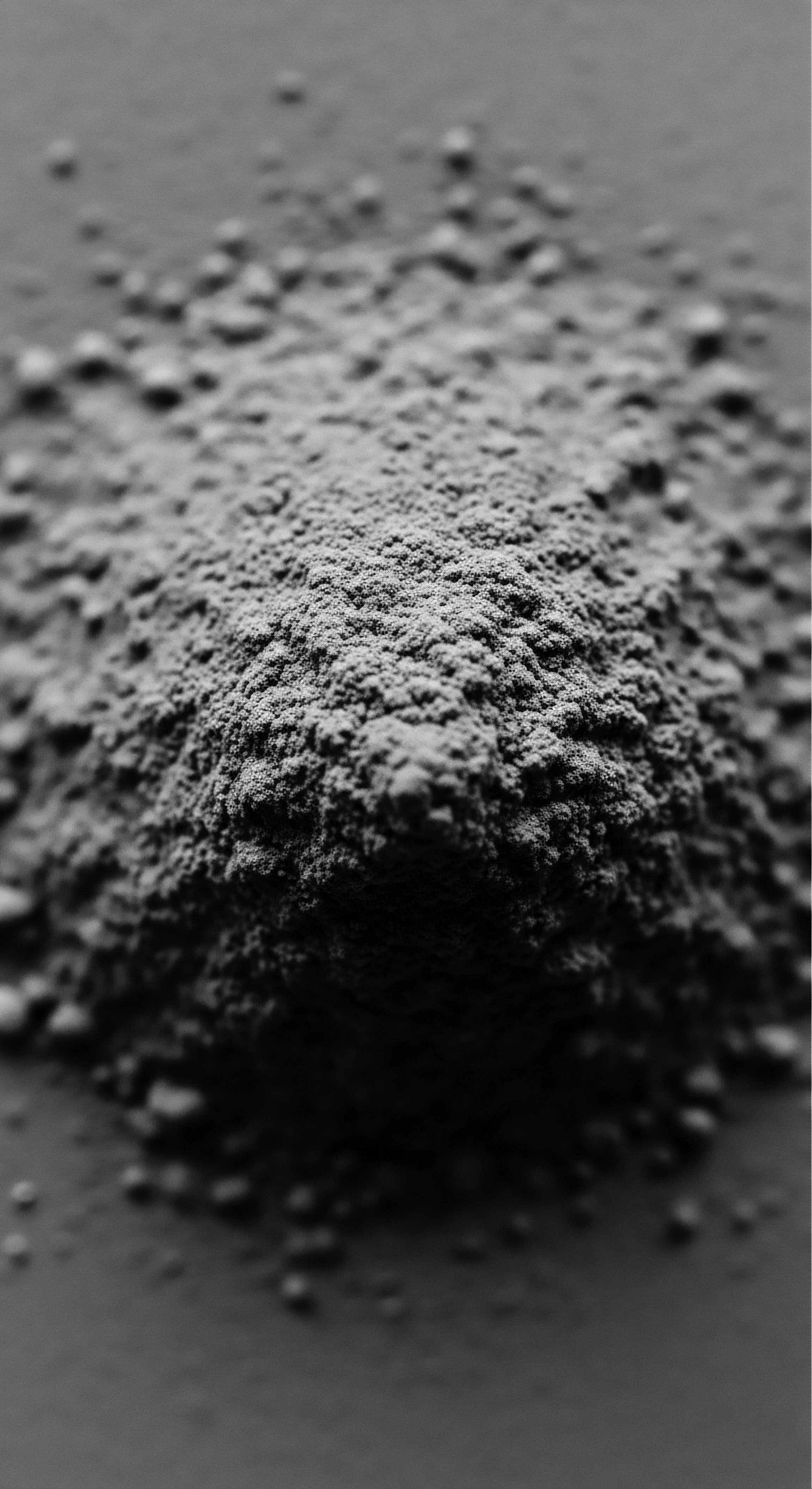
Reflection on the Heritage of Clove Oil Benefits
As we trace the lineage of clove oil benefits from elemental understanding to intricate academic analysis, a powerful truth emerges: the very essence of its utility for textured hair is deeply rooted in heritage. It is a story not simply of chemical compounds and physiological responses, but of wisdom passed through generations, of hands tenderly tending to scalp and strand, and of hair as a profound marker of identity and survival. The journey of clove oil, from ancient spice routes to contemporary discussions of hair wellness, stands as a testament to the enduring foresight of ancestral practices.
The wisdom held within Black and mixed-race hair experiences, often forged in resilience and adaptation, instinctively recognized the fortifying power of nature’s pharmacy. Clove oil, or botanicals possessing similar properties, found its place in rituals not by accident, but through careful observation and inherited knowledge. These practices were not divorced from science; they were science in its most intimate form, lived and embodied, responsive to the rhythms of the earth and the needs of the body. Each application, each fragrant massage, served as a reaffirmation of a connection to lineage, a conscious act of preserving ancestral legacies through the very fibers of one’s being.
The profound connection between hair, history, and healing is rarely linear; it is a spiraling journey of discovery and rediscovery. The re-examination of clove oil benefits through a heritage lens allows us to appreciate the sophistication of pre-industrial hair care, where efficacy was measured not by laboratory readouts, but by palpable results ❉ lustrous hair, a soothed scalp, and a sense of well-being that extended beyond the physical. It reminds us that our hair is a living archive, carrying stories of resilience, artistry, and an enduring quest for holistic health.
The profound meaning of clove oil’s benefits for textured hair lies in its seamless connection to ancestral wisdom, revealing hair as a living archive of heritage and resilience.
In a world that often seeks new solutions, a profound reflection on clove oil guides us back to the wellspring of ancient wisdom. It underscores the importance of listening to the whispers of the past, acknowledging that many modern findings often echo truths long understood by those who came before us. This is the enduring spirit of Roothea: a commitment to understanding hair not just as a biological structure, but as a cultural artifact, a spiritual conduit, and a testament to the boundless ingenuity of human heritage.
The subtle yet potent power of clove oil in nurturing textured hair serves as a poignant reminder that the paths to wellness are often illuminated by the light of ancestral knowledge. Our strands carry the echoes of these journeys, connecting us to a vast, interconnected web of care, tradition, and boundless potential.

References
- Magalhães, P. M. et al. (2007). “Essential oil of Syzygium aromaticum (L.) Merr. & L.M. Perry (clove) from Brazil: chemical composition and antioxidant activity.” Journal of Essential Oil Research, 19(5), 452-455.
- van Andel, T. R. & Ruysschaert, S. (2011). Medicinal Plants of the Guianas (Guyana, Surinam, French Guiana). KIT Publishers.
- Adeyemi, S. O. & Oladele, E. O. (2008). “In vitro antimicrobial activity of essential oil of Syzygium aromaticum (L.) Merrill & Perry (Myrtaceae).” African Journal of Biotechnology, 7(18), 3290-3294.
- Chami, F. et al. (2005). “Antifungal Activity of the Essential Oil from Syzygium aromaticum (L.) Merr. & L.M. Perry (Myrtaceae).” Journal of Ethnopharmacology, 96(3), 579-584.
- Kamath, V. et al. (2003). “Antioxidant and anti-inflammatory properties of eugenol from Syzygium aromaticum.” Fitoterapia, 74(7-8), 603-608.
- Burdock, G. A. & Carabin, I. G. (2009). “Safety assessment of essential oils from clove (Syzygium aromaticum L. Merrill and L.M. Perry).” Food and Chemical Toxicology, 47(12), 3123-3146.
- Namba, T. (1993). The Encyclopedia of Wakan-Yaku (Traditional Sino-Japanese Medicines) with Color Pictures. Vol. 1. Hirokawa Publishing Company.
- Lust, J. (1974). The Herb Book. Bantam Books.

